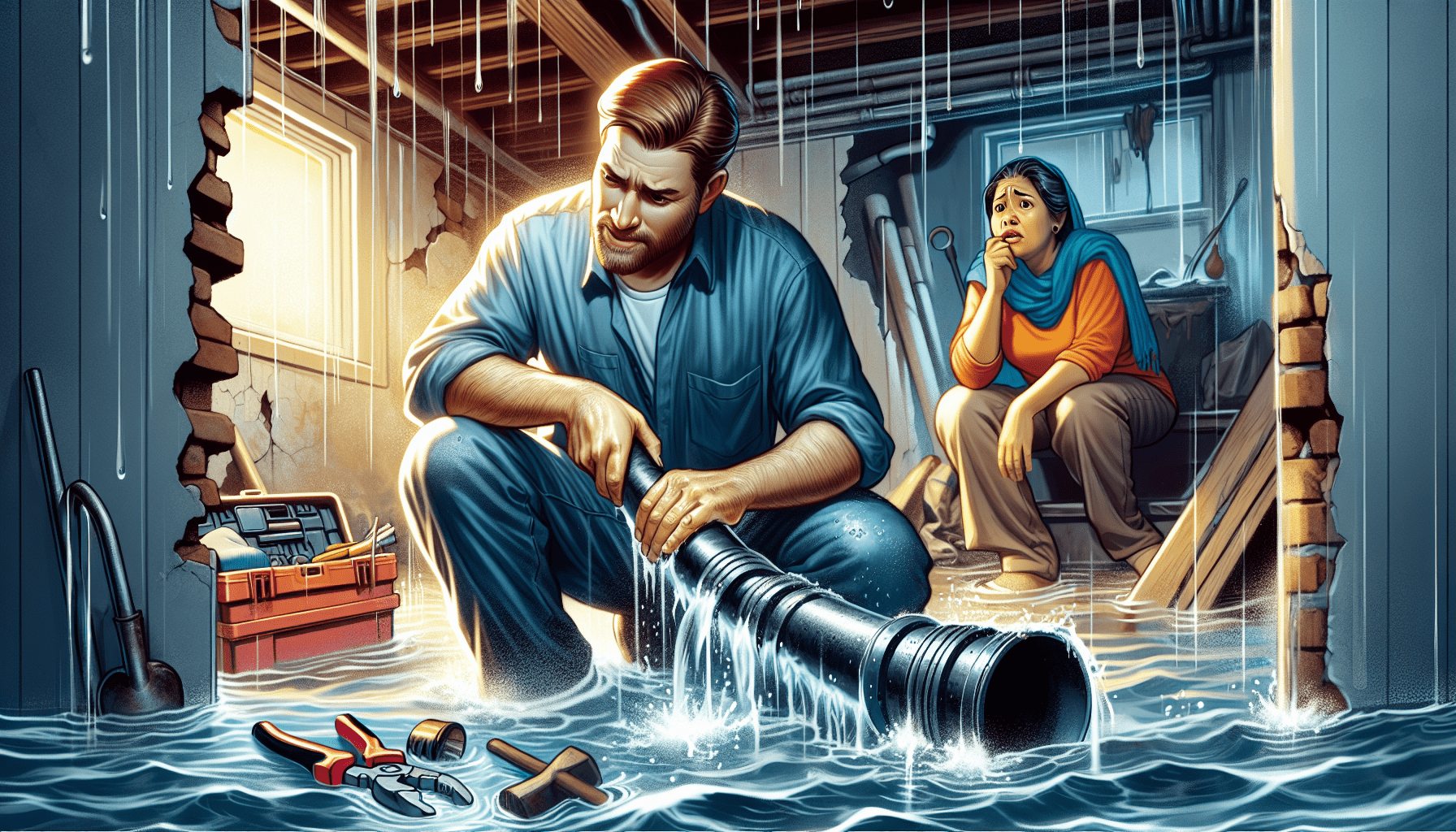When faced with a plumbing emergency, it’s natural to want a quick fix to stop the immediate problem. However, it’s important to consider the long-term solutions to avoid future issues. “Emergency Plumbing: Quick Fixes Vs. Long-Term Solutions” explores the pros and cons of both options, providing valuable insights to help you make the best decision for your plumbing needs. Whether you’re dealing with a burst pipe, a clogged drain, or a leaking faucet, this article will guide you in choosing the most effective solution to ensure your plumbing remains problem-free.
Understanding the Difference
When it comes to emergency plumbing situations, it is important to understand the difference between quick fixes and long-term solutions. Quick fixes refer to temporary solutions that provide immediate relief, while long-term solutions address the root cause of the problem and provide permanent fixes. Distinguishing between the two is crucial for effective plumbing emergencies, as it can save you time, money, and further damage to your plumbing system.
Quick Fixes
Quick fixes are temporary solutions that are aimed at providing immediate relief in emergency plumbing situations. These solutions are often simple and can be implemented quickly, allowing you to temporarily restore the functionality of your plumbing system. For example, using duct tape to patch a leaky pipe or pouring baking soda and vinegar down a clogged drain to clear it are common quick fixes.
While quick fixes can be helpful in the short term, it is important to recognize their limitations. Quick fixes are often temporary and may not address the root cause of the problem. They are meant to provide temporary relief until a long-term solution can be implemented.

Long-Term Solutions
Long-term solutions, on the other hand, aim to address the root cause of the plumbing problem and provide permanent fixes. These solutions require more time, effort, and sometimes professional expertise to implement. For instance, replacing a damaged pipe or installing a backflow prevention device to prevent future issues are examples of long-term solutions in emergency plumbing.
Long-term solutions offer several benefits over quick fixes. They not only fix the immediate plumbing problem but also minimize the risk of future emergencies. By addressing the root cause, long-term solutions provide a more reliable and durable fix, saving you from recurring issues and potential damage to your property.
However, it is important to consider the limitations and considerations of long-term solutions as well. They often require more time, resources, and sometimes professional assistance, which may involve additional costs. It is crucial to weigh the benefits and drawbacks before deciding on a long-term solution.
Assessment and Decision Making
When faced with a plumbing emergency, it is essential to assess the severity and urgency of the situation. Evaluating the extent of the damage, potential risks, and immediate needs will help you determine whether a quick fix or a long-term solution is more appropriate.
Factors to consider when choosing between quick fixes and long-term solutions include the nature of the problem, the availability of resources, your level of expertise, and the potential impact on your daily life. While quick fixes may provide immediate relief, they may not be suitable for complex or recurring issues. Long-term solutions, on the other hand, require careful planning, investment, and sometimes the assistance of professionals.

Impact on Cost and Time
One of the key considerations when deciding between quick fixes and long-term solutions is the impact on cost and time. Quick fixes may offer short-term cost savings, as they often involve inexpensive materials and can be implemented without professional assistance. However, it is important to keep in mind that quick fixes may not provide a lasting solution, and you may end up incurring more expenses in the long run.
Long-term solutions may require more upfront investment, as they often involve replacing or repairing damaged components of your plumbing system. However, these solutions address the root cause of the problem, reducing the likelihood of future emergencies and costly repairs. It is important to balance the short-term cost savings with the potential long-term expenses when making a decision.
Additionally, the time required for implementing quick fixes and long-term solutions should be taken into account. Quick fixes are often simple and can be done relatively quickly, providing immediate relief. On the other hand, long-term solutions may take more time and planning to implement, especially if professional assistance is required. Balancing the urgency of the situation with the time required for a lasting solution is crucial.
Preventing Future Emergencies
In addition to addressing the immediate plumbing emergency, it is important to take steps to prevent future emergencies. By addressing underlying issues and implementing preventive measures, you can minimize the likelihood of encountering similar problems in the future.
Regular maintenance and inspections play a vital role in preventing plumbing emergencies. Scheduling routine check-ups and ensuring that your plumbing system is in proper working condition can help identify potential issues before they escalate into emergencies. Additionally, implementing preventive measures such as installing drain strainers, maintaining proper water pressure, and protecting pipes from freezing temperatures can help avoid costly repairs and emergency situations.
Seeking Professional Help
While quick fixes and DIY solutions may be suitable for minor plumbing issues, it is important to recognize when it is necessary to seek professional help. Plumbing emergencies that involve complex or extensive damage, potential health hazards, or require specialized knowledge and equipment should be addressed by professional plumbers.
Professional plumbers have the expertise, experience, and resources to effectively diagnose and resolve plumbing emergencies. They are equipped with the necessary tools and knowledge to handle a wide range of issues, ensuring a reliable and lasting solution. Choosing reputable and reliable plumbing services is crucial to ensure that the problem is resolved efficiently and effectively.
DIY Quick Fixes
There are instances where a quick fix can be safely and effectively implemented using a do-it-yourself approach. Simple issues such as minor leaks, clogged drains, or dripping faucets may be resolved with readily available tools and materials. For example, using a plunger to clear a toilet blockage or tightening a loose pipe connection can be effective DIY quick fixes.
However, it is important to exercise caution and recognize the limitations of DIY quick fixes. Complex plumbing problems, major leaks, or issues involving the main water supply should be left to professionals. Additionally, it is crucial to follow proper safety precautions, use appropriate tools and materials, and consult reliable sources before attempting any DIY quick fixes.
Consulting with Experts
When faced with a plumbing emergency, it can be helpful to seek advice from plumbing professionals and experts. Consulting with professionals can provide valuable insights, expert opinions, and guidance on the best course of action.
Plumbing professionals can accurately diagnose the problem and provide recommendations for quick fixes or long-term solutions based on their expertise and experience. Additionally, online resources and forums can serve as valuable sources of information and guidance when dealing with emergency plumbing situations. However, it is important to ensure that the information obtained is reliable and accurate before attempting any solutions.
Conclusion
In emergency plumbing situations, it is important to weigh the pros and cons of quick fixes and long-term solutions. While quick fixes offer immediate relief and can be implemented quickly, they may not address the root cause of the problem. Long-term solutions, on the other hand, provide permanent fixes but may require more time, resources, and professional assistance.
When making a decision, it is crucial to consider individual circumstances, the severity and urgency of the situation, the impact on cost and time, and the potential for preventing future emergencies. Seeking professional help, when necessary, ensures that the problem is resolved efficiently and effectively. By making informed decisions and taking appropriate actions, you can navigate emergency plumbing situations with confidence and minimize the impact on your daily life and finances.

